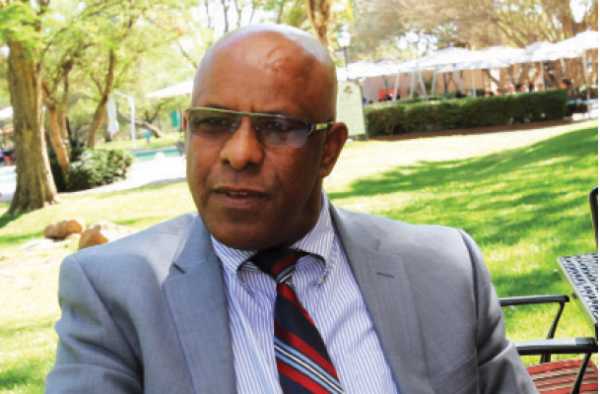Ethiopia, Botswana ready to extend cooperation
Ethiopia is country on the move. And so is Ambassador Plenipotentiary, Mulugeta Kelil, whose remit covers seven countries including Botswana.
The brisk-walking-bespectacled envoy looks like a man who will not miss the forest for the trees. Kelil is passionate about improving Botswana-Ethiopia bilateral relations. Botswana and Ethiopia have longstanding relations dating back to 1990 when Botswana opened its embassy in Addis Ababa, while the Ethiopian embassy in Pretoria, South Africa is accredited to cover Botswana. It also covers Lesotho, Namibia, Madagascar, South Africa and Swaziland. Although the two countries share strong historical ties through their response to the eradication of colonisation and apartheid, they only started meaningful bilateral discussions in 2013 through the Ethiopia-Botswana Joint Technical Committee meeting that was held in Gaborone. According to the former Botswana Ambassador to Ethiopia –now Resident Ambassador- Lapologang Caesar Lekoa, who is credited with opening the Botswana embassy in Addis Ababa in 1999, that meeting, was preceded by the conclusion of a General Cooperative Framework in 2012.
The framework was “largely a statement of intention between the two countries to cooperate in general areas, what is also known as an aspirational document.” From this framework, the senior technical experts identified cooperation in the areas of trade and industry, agriculture (animal husbandry and livestock), mining and minerals, energy, transport and communications, tourism, finance and health and culture. Ambassador Kelil picks the cue, explaining that flowing from this non-binding agreement, Ambassadors of both countries then elevated the cooperation after which the next logical step would be the establishment of a joint ministerial commission. Kelil, who was in Botswana last week to celebrate Botswana’s 49th Independence, says there is interest from both Gaborone and Addis Ababa to elevate bilateral talks to ministerial level. The idea, according to him is to have ministers of both countries meet on a regular basis in order to boost the relationship and also discuss issues of common interest and mutual benefit. “I hope this will be realised soon,” said Kelil in an interview with this publication last Friday.
In fact according to him the two nations are expected to sign a Memorandum of Understanding in December this year in Pretoria, South Africa. “If not it will be signed in January 2016 at the AU summit in Addis,” he revealed. The MoUs to be signed include; extradition treaty; Health sector, mutual legal assistance, civil service, agriculture and sports, youth and culture. Kelil revealed that the two nations are also interested in experience sharing. Ethiopia, a bastion of civilisation, revered as the cradle of humankind, is interested in learning about meat processing; dry ports and mining development and processes in the sector. Botswana on the other hand can learn a lot from Ethiopia which has a world-class infrastructure to support economic growth and streamline connections between Ethiopia and its regional trade partners such as Djibouti. Botswana can benchmark on Ethiopia in the areas of aviation, leather and leather products, democratisation and good governance, Ethiopia’s use of empowerment programmes as well as rehabilitation of degraded land and soil water retention. According to reports, Ethiopia has well-crafted policies that helped the nation register a double digit GDP growth since 2003. In Sub-Saharan Africa the country boasts the fourth largest economy. Twelve (12) years ago Ethiopia was processing leather at intermediary level and exporting to European countries.
The country of 94 million people was also importing shoes of less quality from China. Kelil notes that the government then realised the importance of the sector and introduced radical policies to help grow the sector. “We did not have the technology but government took action,” he explained. Government started giving loans for those involved in all stages of leather and leather products. For the shoe industry the leather institute gives intensive training, some trainers come from abroad, some from Ethiopia. This brings a big change; we now export leather and leather products”, he noted, adding with a good measure of satisfaction, “Now the game of the Chinese has changed, instead of exporting to Ethiopia they have now opened shoe industries in Ethiopia!” The issue of government giving out loans to SMMEs as well as big state owned corporations may sound socialist but the Ambassador maintains that they are only following a “developmental state ideology”. For instance the telecommunications sector is state owned. Every year more than P10 billion can be generated from this sector, Kelil explained.
“This money is given directly to the support of the Ethiopian railway corporation. We have started a tram railway in the city. One sector benefits the other. Next time the money collected from the railway sector will benefit other sectors.” In the areas of peace and security in the highly volatile east African region where Al-Shabab terrorists group wreak havoc, Ethiopia remains in the forefront as chair of IGAD working alongside US forces to negotiate and bring peace to South Sudan and Somalia among others. The ambassador said that as hosts of the African Union headquarters and the United Nations Economic Commission for Africa (UNECA), Ethiopia is committed to Agenda 2063, through which the continent envisages the full achievement of economic integration. “But we believe that we have to start from the level of neighbours then grow into the region,” he said.






